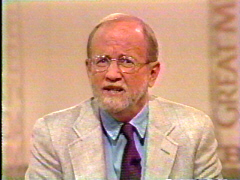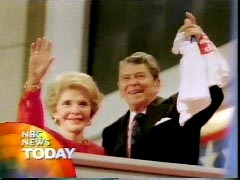 |
|||||||||||||||
|
|||||||||||||||
 |
||
|
 |
||||||||||||
|
||||||||||||
 |
||||||||||||||||||||||||||||||||||||
|
||||||||||||||||||||||||||||||||||||
|
Ronald Reagan
The 40th President and the Press: The Record
By Brent
Baker, Tim
Graham, Rich Noyes and Jessica Anderson
June 14, 2004
Section 1 of 5
![]()
|
In a commemorative issue published the weekend Ronald Reagan died,
Time magazine described the former President as “a man with the power to pull history around a corner” and “change the conversation of our politics and culture as much by the sheer force of his personality as by the power of his ideas.” The national media’s often gracious coverage in the days after Reagan’s death obscured the unfortunate historical record of media coverage: a chronicle often filled with not just disagreement, but with disgust, hatred, ridicule, and insults.
Liberals expressed fear that the first draft of Reagan obituary coverage was too generous, a hagiography, a manufacturing of myth. But these few days are no match for decades of demonization, a myth that Reagan only brought the nation poverty, ignorance, bankruptcy, and a dangerously imbalanced foreign and defense policy. The Media Research Center has assembled a report documenting the “objective” national media’s most biased takes on President Ronald Reagan, his record and his times: I. REAGAN THE MAN With the death of Ronald Wilson Reagan, many Americans will remember stories about the man and the President, his leadership and his vision, his humanity and his optimism, his deep love of country and his belief in the power of freedom. Everything Reagan sought to accomplish seemed ludicrous and uneducated to the long-standing liberal consensus. Tax cuts would be wildly inflationary. Government was the solution, not a generator of problems. A foreign policy based on the radical notion that communism should be put on the ash heap of history was dismissed as a bellicose fantasy that was too dangerous for the nuclear age. Reagan was portrayed as an unintelligent airhead who lived in a fantasy world, a mesmerizing Music Man fooling the public with a phony bill of goods, a man who was cruel or uncaring to poor people and a puppet for the greedy rich. Reporters often agonized over why the American public liked Reagan, couldn’t see through the White House spell and see Reagan in the contemptuous light as did they. “Pretty simplistic. Pretty old-fashioned. And I don’t think they have much application to what’s currently wrong or troubling a lot of people....Nor do I think he really understands the enormous difficulty a lot of people have in just getting through life, because he’s lived in this fantasy land for so long.” “The mission that Reagan has embarked upon has nothing to do with his personal charm. He has set out to reverse the course of American government that was charted by Franklin Roosevelt. If F.D.R. explored the upper limits of what government could do for the individual, Reagan is testing the lower limits. Reagan’s opinions and policies would be enough in another time to have protesters marching in the streets, or worse. And yet something about Reagan soothes and unites — even though the effects of his programs may repel.” “So I think [Ronald Reagan] is going to have to pass two or three tests. The first is, will he get there, stand in front of the podium, and not drool?” “The Acting President: Ronald Reagan and the Supporting Players Who Helped Him Create the Illusion That Held America Spellbound” “They [Reagan and Thatcher] quickly formed a bond that overcame their differences of age, gender and — many whisper — IQ scores.” “To the self-indulgent age of the ‘80s and to the characters that gave it special flavor at home — Oliver L. North and Ronald Reagan, Michael Milken and Ivan Boesky, Jim and Tammy Faye Bakker, Arthur Laffer and his curve, the Yuppies and the leveraged buyout dealmakers — good riddance.” “Reagan’s approval ratings never put him in the top rank of most popular Presidents; that was always a myth. And his confectionary, heavily scripted presidency tended to lead the country backward.” “[Bush] is about to make matters worse by hauling out Ronald Reagan at the Republican convention. Reagan has become a symbol of what went wrong in the ‘80s. It’s like bringing the Music Man back to River City, a big mistake.” “I think the best evidence I can give that we do a lousy job covering politics is to look at the politicians: Ronald Reagan was President of us for eight years — Ronald Reagan! Reporters should have been writing for the entire eight years of his reign that this man was gone, out of it....He should have been covered as a clown.” “All of us who covered the Reagans agreed that President Reagan was personable and charming, but I’m not so certain he was nice. It’s hard for me to think of anyone as nice when I hear him say ‘The homeless are homeless because they want to be homeless.’ To my mind, a President should care about all people, and he didn’t, which is why I will always feel Reagan lacked soul.”
“I was a correspondent in the White House in those days, and my work which consisted of reporting on President Reagan’s success in making life harder for citizens who were not born rich, white, and healthy saddened me. My parents raised me to admire generosity and to feel pity. I had arrived in our nation’s capital [in 1981] during a historic ascendancy of greed and hard-heartedness.” “Let’s not debate his presidency, but his passing. As opposed to a man like Reagan, Nixon is, was highly regarded as a genuine statesman with a first-class mind.” “How much did Reagan fool the American people and how much did he simply play into their wishes? Were they misled by the nature of his campaigning or were they led into ways they wanted to go? Was Reagan sort of a modern Pied Piper? It’s my instinct about it that he very successfully delayed the apprehension of reality by this country for about a decade. He made people feel that things were better than they were, that the external dangers were greater than they were.” Time’s Jack White: “And he was extraordinarily lucky in that he wasn’t brought down by the Iran-Contra scandal.”
Co-host Bryant Gumbel: “Well, later on this morning we’re going to be talking on this President’s Day about this presidential survey. Who would you think finished first?...Of all the Presidents when they did first to worst. Oh c’mon, you would know.”
The Media Research Center For an interview with an MRC Spokesman, please contact Colleen O'Boyle at (703) 683-5004
Home | News Division
| Bozell Columns | CyberAlerts |
||||||||||||||










